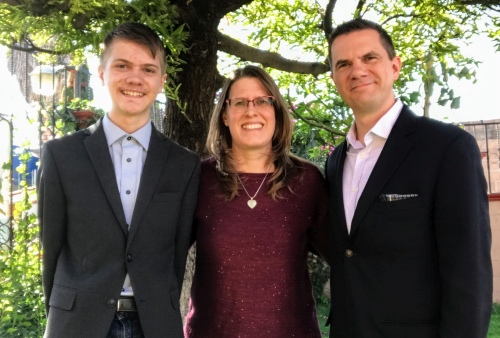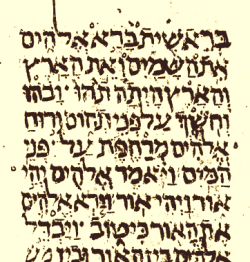Let’s continue our look at Genesis 1 and 2 (part 1 here: 7 Hebrew Words).
There is a lot that we can learn about humans from these chapters. And as I’ve said, we’ll be back here a lot as we continue this conversation (Lord willing). If you’d like to take a few minutes to meditate for yourself, why not read Genesis 1:25-31 and make a list of some of your initial observations about humankind.
There are three key things that I learned from this text, that I would like you to remember. Three keywords. Let’s just cover one today. And this may get a little philosophical, so hold on to your hats.
1. Truth
It’s interesting to note that everyone seems to have some kind of basic “authority”. We might also say that everyone has “presuppositions”. Here’s a common example: “empiricism”.
“Empiricism” comes from the Greek word for experience. Basically, in empiricism, the ultimate authority is observation. You learn truth by what you see, hear, taste, and so on. Knowledge is based on experience.
For the Christian, although we recognize that there are various ways to learn truth, our ultimate authority is God’s Word – revelation – the Bible.
Weird, eh? So, instead of observing and gaining scientific knowledge, we believe in some old religious book? That doesn’t sound very reasonable, does it?
But wait a moment. Without that book, science couldn’t exist.
“Wait a minute”, you say. “Many atheists believe in science. Hey, some are actually very good scientists themselves!”
You’re right. Let’s put it this way. Without the truth of this Book, science could not exist.
Ok, let’s say that all knowledge comes from observation. Here’s a question. How do you know that all knowledge comes from observation? Have you observed every little bit of truth in the cosmos, and have you observed that every bit of truth can be observed? And you’re sure that no truth exists outside of your observation? How do you know that what you’re observing is “true”?
Of course not. So, as an ultimate system of knowledge, this idea is inconsistent. The foundation of this idea is unstable.
Now here’s something that most people don’t think about: You really can’t test a supreme authority. If you could, then you would be the supreme authority, with the ability to judge the lesser authority.
But here’s something you can do, to some extent. You can see that your authority is consistent – it’s logical.
Listen, I agree – we can learn a lot from observation. But how do I know?
What if – what if Someone who is the source of all knowledge and the source of all that exists – what if that Someone were to tell me something? That would be a solid foundation for my knowledge.
Now, imagine that we all evolved by chance from a bunch of amoebas. We’re just a random collection of chemicals. Like an alien in Star Trek says, we’re bags of mostly water (because our bodies are mostly made of water). How do we know that our observations are correct? How does a bag of chemicals know anything? Maybe we just think we know something.
If your brain is just a bunch of broccoli of a different colour, why should you trust it? Maybe your species learned to survive and reproduce by believing false things.
Or, if something is true today, will it be true tomorrow? Why?
Maybe every 5000 years, all the laws of mathematics change. Poof! 4+4 now equals pink.
Now many people say, “Ok, maybe, but at least the knowledge I have ‘works'”. How do you know it “works”? And what do you mean, “works”?
And of course many people today try to argue that absolute truth doesn’t exist at all. (Of course, the stereotypical response is – how can you say that it’s universally absolutely true that nothing is universally absolutely true?)
Great, so imagine that your surgeon no longer needs to attend university, because there is no universal truth. Would you like that person to do your next heart surgery?
But what if God made the world, and then told us what He did? That would mean that we have a trustworthy source of truth. And He created an orderly universe, with certain “laws”. And what if He wants to communicate with us? He wants to be known. Well, we would expect that He would communicate with us, in a way we would understand, right?
Check this out:
Thus says the LORD: “If I have not established my covenant with day and night and the fixed order of heaven and earth, then I will reject the offspring of Jacob and David my servant and will not choose one of his offspring to rule over the offspring of Abraham, Isaac, and Jacob. For I will restore their fortunes and will have mercy on them.”
Jeremiah 33:25-26
God is the source of physical laws. God fixed natural laws in place at the creation. And so, we expect that those laws will be the same tomorrow, because God created them, and God wants us to know Him.
You might have noticed some other things in Genesis 1 and 2. God separates things, and that is good. Creation isn’t just a big grey ball of creation, right? Look at all the different people, even just in your own family, or your own neighbourhood! Look at all the different plants, animals, climates . . . this is not an illusion, it’s real!
Have we not all one Father? Has not one God created us? Why then are we faithless to one another, profaning the covenant of our fathers?
Malachi 2:10
God created everyone. And so we should have a relationship with one another based on truth. We should not be “faithless”, as Malachi says.
Not only is God the source of physical laws, God is the source of loyalty and trust.
For thus says the LORD, who created the heavens (he is God!),
Who formed the earth and made it (he established it; he did not create it empty, he formed it to be inhabited!):
“I am the LORD, and there is no other.
I did not speak in secret, in a land of darkness;
I did not say to the offspring of Jacob, ‘Seek me in vain.’
I the LORD speak the truth; I declare what is right.
Isaiah 45:18-19
There it is. God wants us to have a relationship with Him. And so He speaks the truth.
And so this is why it is possible to search for and find truth.
And here we see one of the purposes of the earth – “he formed it to be inhabited”.
The God who made the world and everything in it, being Lord of heaven and earth, does not live in temples made by man, nor is he served by human hands, as though he needed anything, since he himself gives to all mankind life and breath and everything.
And he made from one man every nation of mankind to live on all the face of the earth, having determined allotted periods and the boundaries of their dwelling place, that they should seek God, and perhaps feel their way toward him and find him. Yet he is actually not far from each one of us, for “‘In him we live and move and have our being’; as even some of your own poets have said, “‘For we are indeed his offspring.’
Acts 17:24-28
It’s possible to seek God. He created us, He gave us a place to live. And He wants to have a relationship with us. Again, this is why it is possible to search for, and find, truth. And we could also say, it’s possible to seek for, and find, God.
God reveals Himself. He ordered the universe so that we would find repeatable physical laws at work. Also, moral laws, a difference between good and evil. We can learn coherent rules of logic. God wants us to know Him.
That’s why true knowledge or wisdom starts with God. Proverbs 1:7a, “The fear of the LORD is the beginning of knowledge…”
Of course, you can possess knowledge without “fearing the LORD”. But you must assume that you live in God’s creation – that is, that there is some transcendent order in the universe. As some have put it, you must “steal” our biblical vision of the world in order to hold up your understanding. Because without God’s Word, your worldview isn’t stable and consistent – there is no solid foundation.
Next time we’ll try to get to the next two words – which should be a little simpler!




